The SSD Relapse: Understanding and Choosing the Best SSD
by Anand Lal Shimpi on August 30, 2009 12:00 AM EST- Posted in
- Storage
What's Wrong with Samsung?
The largest SSD maker in the world is Samsung. Samsung makes the drives offered by Apple in its entire MacBook/MacBook Pro lineup. Samsung makes the drives you get if you order a Lenovo X300. In fact, if you're buying any major OEM system with an SSD in it, Samsung makes that drive.
It's just too bad that those drives aren’t very good.
This is the 4KB random write performance of Samsung's latest SSD, based on the RBB controller:
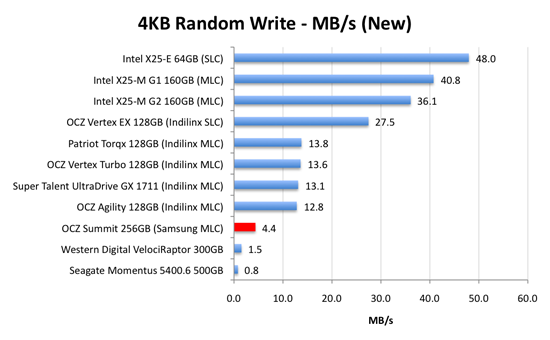
4.4MB/s. That's 3x the speed of a VelociRaptor, but 1/3 the speed of a cheaper Indilinx drive.
Speedy, but not earth shattering. Now let's look at performance once every LBA has been written to. This is the worst case scenario performance we've been testing for the past year:
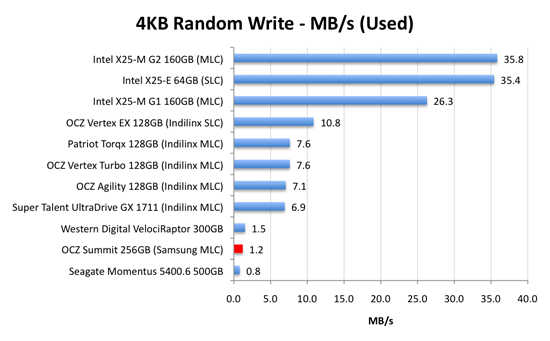
...and now we're down to mechanical hard drive speeds
Holycrapwtfbbq? Terrible.
Now to be fair to Samsung, this isn’t JMicron-terrible performance. It’s just not worth the money performance.
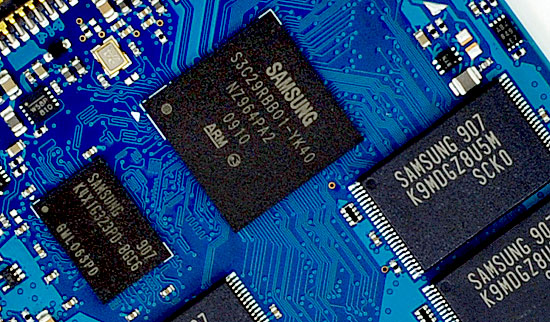
The Samsung RBB based SSDs are rebranded by at least two manufacturers: OCZ and Corsair.
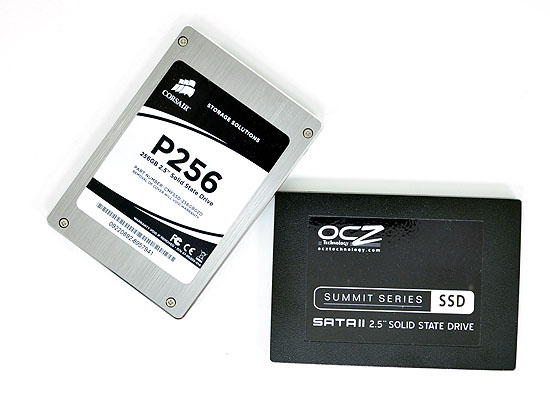
The OCZ Summit and the Corsair P256 both use the Samsung RBB platform.
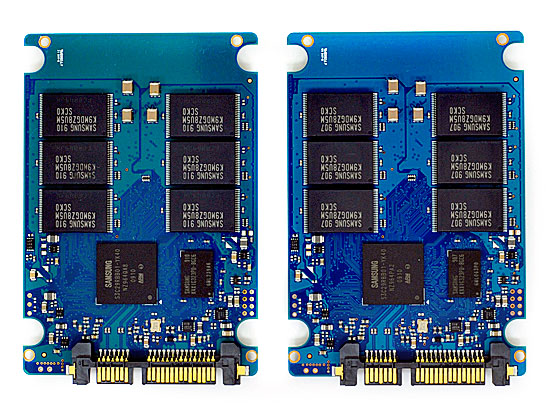
The Corsair and OCZ Samsung RBB drives.
The drive most OEMs are now shipping is an even older, lower performing Samsung SSD based on an older controller.
I talked to some of the vendors who ship Samsung RBB based SSDs and got some sales data. They simply can’t give these drives away. The Indilinx based drives outsell those based on the Samsung RBB controller by over 40:1. If end users are smart enough to choose Indilinx and Intel, why aren't companies like Apple and Lenovo?
Don't ever opt for the SSD upgrade from any of these OEMs if you've got the option of buying your own Indilinx or Intel drive and swapping it in there. If you don't know how, post in our forums; someone will help you out.
Samsung realized it had an issue with its used-state performance and was actually the first to introduce background garbage collection; official TRIM support will be coming later. Great right? Not exactly.
There’s currently no way for an end user to flash the firmware on any of these Samsung drives. To make matters worse, there’s no way for companies like OCZ or Corsair to upgrade the firmware on these drives either. If you want a new firmware on the drive, it has to go back to Samsung. I can’t even begin to point out how ridiculous this is.
If you’re lucky enough to get one of the Samsung drives with background garbage collection, then the performance drop I talked about above doesn’t really matter. How can you tell? Open up Device Manager, go to your SSD properties, then details, then select Hardware Ids from the dropdown. Your firmware version will be listed at the end of your hardware id string:
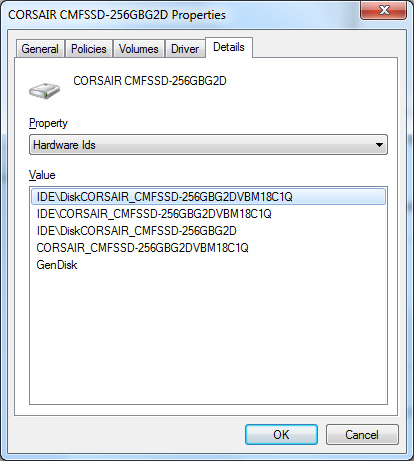
Version 1801Q doesn’t support BGC. Version 18C1Q (or later) does.
How can you ensure you get a model with the right firmware revision? Pick a religion and start praying, because that’s the best you can do.
Now the good news. When brand new, the Samsung drives actually boast competitive sequential write, sequential read and random write speeds.
These drives are also highly compatible and very well tested. For all of the major OEMs to use them they have to be. It’s their random write performance that’s most disappointing. TRIM support is coming later this year and it will help keep the drives performing fresh, but even then they are still slower than the Indilinx alternatives.
There’s no wiper tool and there’s currently no method to deploy end-user flashable firmware updates. Even with TRIM coming down the road, the Samsung drives just don’t make sense.










295 Comments
View All Comments
Mr Perfect - Tuesday, September 1, 2009 - link
Probably demand. When I saw that price, I shopped around to see what was going on. Answer? Everyone else seems to be out of stock.Naccah - Tuesday, September 1, 2009 - link
I've been waiting to get an SSD till Win 7 released hoping that the prices would have stabilized somewhat by that time. The recent price fluctuation is disturbing as well as the availability of the X25 G2. When the G2 first hit Newegg I was surfing the site and could have grabbed one for $230, but like I said I was content to wait. Now I'm having second thoughts! and wondering if I should grab one if the price goes down again.gfody - Tuesday, September 1, 2009 - link
That doesn't explain the 160gb - it's not even in stock yet. I have been waiting a month for this drive to be in stock and here they more than double the price one day before the ETA date! It's an outrage.. if I'd known the drive was $1000 I would have bought something else.Way to screw your customers Newegg
araczynski - Tuesday, September 1, 2009 - link
A) your intro has the familiar smell of tomshardware, you'd do to be without that, its unbecoming.B) your final words smell of the typical big corp establishment mentality; bigger, faster, more expensive, consumers want! while if the market is any indication, is completely the opposite of the truth. people want 'good enough' for cheap, as the recent Wired magazine article more or less said. granted, Wired isn't the source for indepth technical reading, but it is a good source sometimes of getting the pulse of things...sometimes, still, more often than anything coming out of the mouths of the big corps.
C) everything in between A and B is great though :) Please leave the opinions/spins to the PR machines.
Personally, the cost of these things is still more than i'm willing to pay for, for any speed increase. the idiotic shenanigans of firmwares and features only present after special downloads/phases of the moon make me just blow off the whole technology for a few more years. I'll revisit this in say 2 or 3 years, perhaps the MLC's will finally die off and the SLC's (unless i have the 2 backwards) or something better rolls out with a longer lifespan.
Anand Lal Shimpi - Tuesday, September 1, 2009 - link
A) My intention with the intro was to convey how difficult it was for me to even get to the point where I felt remotely comfortable publishing this article. I don't like posting something that I don't feel is worthy of the readership's reception. My sincere apologies if it came off as arrogant or anything other than an honest expression of how difficult it was to complete. I was simply trying to bring you all behind the scenes and take you into the crazy place that's my mind for a bit :)B) I agree that good enough for cheap is important, hence my Indilinx recommendation at the end. But we can't stifle innovation. We need bigger, better, faster (but not necessarily more expensive, thank you Moore's Law) to keep improving. I remember when the P3 hit 1GHz and everyone said we don't need faster CPUs. If we stopped back then we wouldn't have the apps/web we have today since developers can count on a large install base of very fast processors.
Imagine what happens in another decade when everyone has many-core CPUs in their notebooks...
Take care,
Anand
DynacomDave - Tuesday, September 29, 2009 - link
First - Anand thanks for the good work and the great article.I too have an older laptop that has a PATA interface that I'd like to upgrade with an SSD. I contacted Super Talent about their MasterDrive EX2 - IDE/PATA. Their response was; We only use Indilinx controller for SATA drives, like UltraDrive series. We use Phison controller for EX2/IDE drives.
I want to improve performance not degrade it. I don't know if this will perform like the Indilinx or like the old SSDs. Can anyone help me with this?
bji - Tuesday, September 1, 2009 - link
There are a few more smaller players in the SSD controller game that don't ever show up in these reviews. They are Silicon Motion and Mtron. The reason I am interested in them is because I have a laptop that is PATA only (it's old I know but I love it and I want to extend its life with an SSD), and I am trying to get an SSD that works in it.Turns out the Mtron MOBI SSDs are not compatible with this laptop. I have no idea why. So I have put an order into eBay for an SSDFactory SSD and am crossing my fingers that it will work.
Mtron makes SATA SSD drives so they could be included in these reviews, and I don't know why they are excluded. It would be interesting to see how their controllers stack up. I personally own two Mtron SSD drives (both 32 GB SLC drives) that I tried to get to work in my laptop and failed to - so one is now the system disk in my desktop and it is very fast (at least compared to platter drives, maybe not compared to newer SSDs). The other one I am still trying to find a use for.
The only Silicon Motion controller drives I have seen are PATA drives so they clearly are a different beast than the SATA drives typically reviewed in these articles. But I would still be interested in seeing the numbers for the Silicon Motion controller just to get an idea of how well they stack up against the other controllers, especially for the 4K random writes tests. The PATA interface ought not to be the limiting factor for that test at least.
paesan - Tuesday, September 1, 2009 - link
I see NewEgg has a Patriot Troqx and a Patriot Torqx M28. What is the difference in the 2 drives.paesan - Tuesday, September 1, 2009 - link
After reading thru the Patriot forum I found the differences. The M28 has 128MB cache compared to 64MB cache on the non M28. The biggest difference is the M28 uses a Samsung controller instead of the Indilinx controller on the non M28. I wonder why they switched controllers.valnar - Tuesday, September 1, 2009 - link
It seems to be that using trim would make a "used" SSD faster, no doubt, but is it required? Would it be okay to buy an SSD for a Windows XP box and just set and forget it? Even used and fragmented, it appears to be faster than any hard drive. My second question is longevity. How long would one last compared to a hard drive?